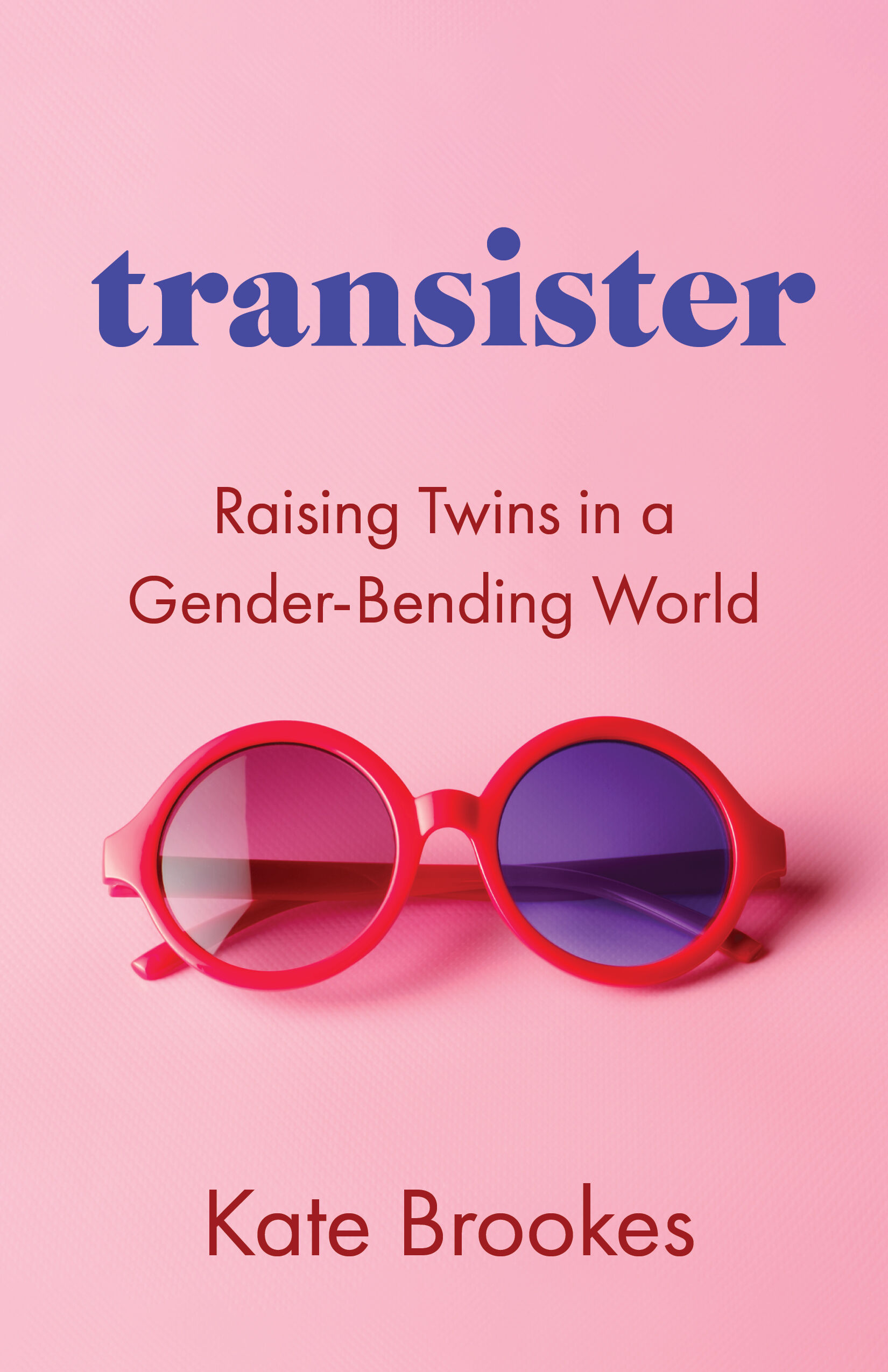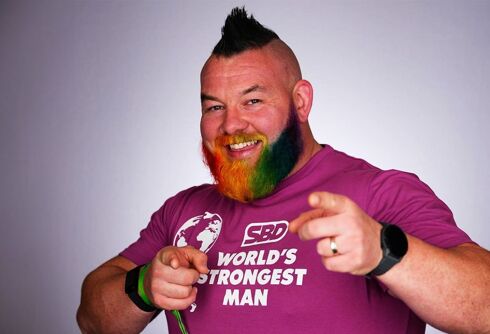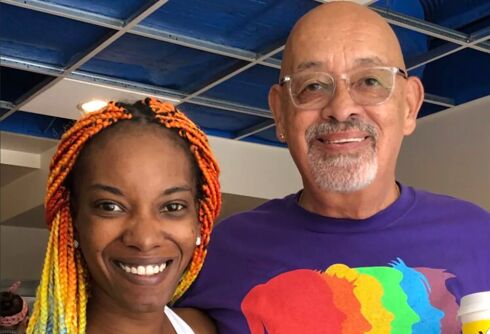These are excerpts from award-winning journalist Kate Brookes’ new book, Transister, a chronicle of her daughter’s transition and the harsh realities facing transgender kids and their families.
By the time her twins were 8, Kate had two realizations: 1) her doctor’s “it’s another boy” announcement was flat-out wrong, and 2) there’s no such thing as a “normal” family — and that’s a beautiful thing.
Related:
These twins came out to their mom. Her reaction is so perfect they put it on YouTube.
After some small talk and more than a little stalling, the twins broke the news. And then mom spoke up.
“I just couldn’t do it,” I said to Mike that night as we checked in on the boys, Jacob sound asleep holding on to his steering wheel pillow, Gideon wrapped in a Tyrannosaurus rex and velociraptor–clad quilt, fingers still clutching a naked Barbie. “I know he wanted the princess set, but it’s Jacob’s room too. And I didn’t think it would be fair.”
Never Miss a Beat
Subscribe to our newsletter to stay ahead of the latest LGBTQ+ political news and insights.
“I don’t disagree, Katie,” he reassured me. “I wouldn’t have let him get that one either. I think you did the right thing.”
I nodded. But I wasn’t so sure.
I tossed and turned for much of the night. Did Gideon really believe we didn’t buy the princess comforter because it didn’t match his new room? He hadn’t mentioned anything about it when we got home that afternoon. But I kept replaying the incident at the store over and over in my mind—each time seeing his big, wide smile turn into a frown and watching that pure childhood excitement leave his eyes when I said “no.” How many other times, I wondered, had I denied his wants and wishes because they didn’t align with my—or society’s—expectations? But we let the kid dress as Cinderella for Halloween, I reminded and reassured myself; that had to mean we were supportive parents, right?
Then I thought back to the boys’ last birthday party. We had long ago agreed that, despite sharing my womb and their birthday, the twins should never share a cake. Each kid should have their own personally curated and designed pastry with their own candles to blow out. Easy enough. Or so we thought.
It’s not that we didn’t want to get Gideon the Barbie cake he requested. It’s more like we were scared to get him a Barbie cake. Or a Cinderella cake. Or a Rapunzel cake.
Scared of what? I’m not entirely sure. Maybe that some kid might laugh at G on his special day and make him feel “less than.” Or, even worse, that a parent might say something derogatory, not only making fun of our son but also questioning my parenting and making me feel “less than.”
Ultimately, Jacob settled on a football theme and G, after some initial reluctance, wound up with hearts and flowers. If partygoers or their parents thought that was odd, they sure didn’t say anything to us. In fact, much of the hubbub at cake time was spent cleaning up after a kid who tossed his cookies about six minutes after the boys blew out their candles.
Would anything have turned out differently, I wondered, if Gideon had blown out his candles on a Cinderella cake? He’d sure seemed happy enough when he saw the hearts and flowers. Much like he’d seemed happy enough clutching his Barbie at bedtime earlier tonight in his newly decorated bedroom. But would happy “enough” be enough for Gideon?
Gideon and I were walking home from school. It was unseasonably warm for late March, and my son had tied his sweatshirt around his waist as we trekked the seven blocks toward our apartment. I was happy he was holding my hand and glad for this time together.
“How was your day, my love? Did you and Gila play together at lunch?”
“Yup. And she let me braid her hair too!” he replied, his bright blue eyes growing wider, a proud smile plastered across his little eight-year-old face. “My first French braid!”
“Wow, that’s awesome, G,” I told him. “I bet she loved it. I never came close to perfecting a French braid.” Hell, I can still barely manage a ponytail, I thought but didn’t say.
“She did love it!” he exclaimed and then looked away. “She told me she loved it a lot!”
We walked the next few minutes without saying much, swinging our arms together, occasionally flashing each other a smile. Then, two blocks from our high-rise, while waiting for the light to turn, Gideon squeezed my hand a little tighter, looked up at me, and said softly, calmly, matter-of-factly, “Mama, I think I’m a transister.”
I’m sure I responded instantly, but in my mind, it felt like the ground swirled away below me, my head spun upward, and my insides were caught in the funnel. Here we were, in the very moment I had prepared for—and avoided and denied and role-played and denied again.
Grabbing ahold of myself, I took a breath and crouched down so I would be at Gideon’s eye level, then reached for his other hand and replied, “You mean transgender, my love?”
“Yes, transgender,” he continued, seemingly unaware that his mother was silently hyperventilating. “When I was in your belly, it was a mistake. I was supposed to come out a girl.”
“Oh, baby, nothing about you is a mistake,” I wish I had said. But instead, in more “shock mode” vs. rational reaction, I fell back on what I’d planned to say when this moment that I’d refused to admit was coming finally arrived. “It’s okay, Gideon, you can be a girl. And if you say so, then you are a girl. Daddy and I love you and are so proud of you, and we’ll help you get through this.”
To this day, I’m not quite sure what Gideon thought I meant when I said, “We’ll help you get through this.”
I’m not even sure I knew what I meant—with its implication that, as always, there would be an end point, a finish line I would work us toward, a day when whatever challenge we faced would be behind us.
What I did know was that, as scary as that moment was, it was also a huge relief. Our child was finally figuring out who he was, and I could only hope, if not believe, that her life would ultimately be better because of this.
One morning just a couple of days into our trip, I woke up early, grabbed my laptop, and logged on to Facebook.
“I hate Facebook,” my husband used to say to everyone who would listen.
“I know you do, babe,” I’d answer and roll my eyes.
“And the only thing I hate more than Facebook—”
“Are the people who use it!” I’d finish for him.
“Exactly!”
“But I use Facebook,” I’d part whine, part shout, part laugh.
“Well, okay,” he’d concede. “I love you, but I still hate Facebook.”
The routine never got old.
And for many reasons, I did love Facebook. It drew me closer to people, made me feel more connected. To old friends, new friends, former classmates. And now to parents, like me, who had gender-nonconforming and/or transgender kids. Sharing the joy a mom felt for her AFAB (assigned female at birth) son who’d just had top surgery and was now posing in his recovery room with a big thumbs up and a bigger smile. And also sharing the despair of a father who’d just lost his transgender daughter to suicide.
I’d been reading the message boards and posts more frequently in the past few months. I wasn’t sure I’d ever post anything myself, but I knew that I felt much less alone knowing there were other parents like me, with kids like mine, out there.
But this morning I wasn’t reading about chest binders, bottom surgeries, or T shots. I was looking for “likes.” And I got them. The sheer number I’d racked up for this summer’s first Myrtle Beach picture made me very happy. But it was some of the comments that really made my heart sing.
I’d posted one pic of the kids leaning over our balcony, staring ahead at the ocean, which was only about thirty-five yards from us. I’m sure I’d taken and posted some variation of this picture every summer, but this year’s rendition was different: Jacob, looking tan and significantly taller than his eight years would suggest, was wearing long basketball shorts and a LeBron jersey, his hair cut super short. G, dark hair brushing her shoulders, stood to his left in a fitted white T-shirt, the turquoise sweatshirt we’d bought in the girls’ section of Old Navy wrapped around her waist, concealing her gym shorts.
“Twinning in our happy place” was how I captioned the picture.
One comment stood out. “A million things I love about this picture,” one of my dearest friends from college had written just a few minutes before.
I wasn’t sure if she was still online, but I instant messaged her anyway:
Me: Hey, babe! How are you and your gorgeous crew? I’m sure it’s not super surprising from the pics . . . but looks like G will transition to a girl before school. Been years in the making and it’s looking like the time is now(ish)!
Her: I think, as I always have, that she is beautiful and looks happy. And I think you’re the best mom. I’d like to do a photo shoot with just you and her together.
Me: I can’t wait. Thank you, Jodi!
Her: She going to change her name?
Me: We’re like on name 10. Still only in private though. Liv was yesterday’s. Today we are back to G.
Her: Well, I hope she picks something strong and brave and full of life like she is. Love you all!
Me: Back at you, babe!
I wondered what my other 1,221 Facebook friends could tell from my posts. Was it obvious one of my kids was about to transition?
Was it obvious I was holding in the biggest secret of my life?
Suddenly, I realized that G might not be coming out in Carolina . . . but I was.
When it comes to my life, I’m pretty open. I don’t hide much, don’t get embarrassed by much, and, on the contrary, sometimes inadvertently make others uncomfortable by saying too much.
Want to know what meds I take? I’ll tell you.
How many men I’ve slept with? I can estimate.
But my business and my kids’ business are two separate beasts.
Still, with the extensions firmly in place (“Gabriella, please stop tugging your hair!”), Mike and I figured it was time to tell our circle.
We’d been crafting an email for months. Had even sent a preliminary one to the clergy at our synagogue over the summer to give them a confidential heads-up. But this note was different. Mike and I planned to send it to the parents of the kids’ entire grade at their Jewish day school before classes began that fall.
We wouldn’t be sending anynote to the parents at Gabriella’s new school, where she was planning to go stealth and where only a handful of kids had known “Gideon” previously. Yet here we were, sending an email to dozens of parents at her old school—announcing her transition.
But how could we not? Gabriella had known many of these families since she was two. She’d made her best friends at this school. Mike and I had become close friends with many of the parents. And perhaps most importantly, Jacob was still attending the school, and we needed to make sure his transition to third grade went as smoothly as possible. Could you imagine the confusion if Gabriella, sporting her long hair and purple sundress, came to pick up Jacob after school and no one knew Jacob’s brother was now his sister? Exactly. We couldn’t do that to Jacob. Or to Gabriella.
Hence the email. Which would also give parents the chance to discuss the change with their kids in their own homes and on their own terms.
I was simultaneously excited and petrified the moment I pressed send.















